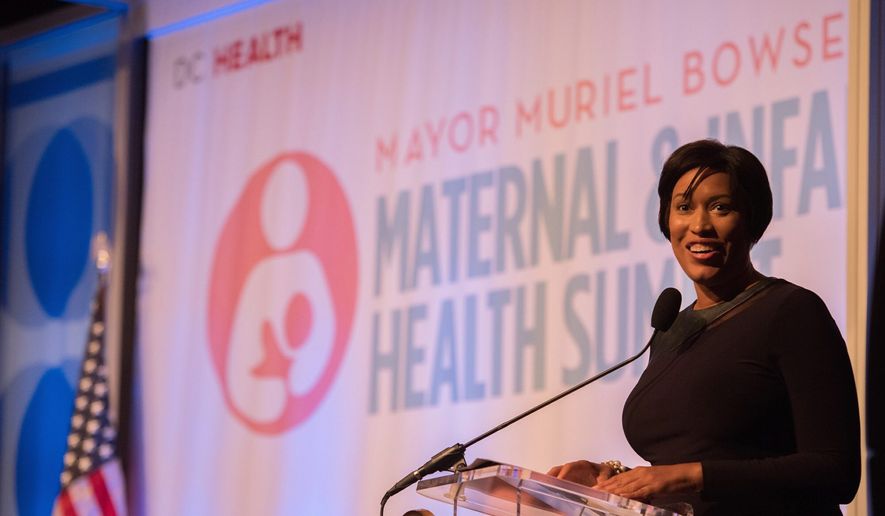D.C. Mayor Muriel Bowser held an inaugural summit on maternal and infant health Wednesday, marking almost a year since two maternity wards in the District’s poorest wards shut down amid increased attention on health disparities among pregnant women in the U.S., especially women of color.
The summit brought together nearly 1,000 people, including politicians, health providers and community workers to discuss best practices to improve health outcomes for women and children.
No specific action plans were put forward, with the mayor saying the summit was an opportunity to connect interested parties, improve communication about available services and identify areas of improvement.
“We don’t have all of the answers,” said Miss Bowser, who adopted a daughter earlier this year. “There’s a lot of things that are contributing to our less than optimal outcomes and we have to we can’t continue to only do the things we’ve done in the past.”
With a population of about 700,000, the District has eighth highest maternal death rate among the states, according to data from the Centers for Disease Control and Prevention compiled by the D.C. Department of Health.
The most recent CDC data show that 29.39 D.C. die of pregnancy-related causes per 100,000 live births, the city’s health department reports.
Nationally, black women die during pregnancy at a rate of 40 per 100,000 births, compared to white women (12.4) and other races (17.8), according to CDC data.
Maternal deaths in the District, including life-threatening complications, occur at much higher rates. Between 2012 and 2016, about 660 women needed a blood transfusion following labor and delivery in the city.
“I don’t think we can point to one thing, this is why African-American women are having the disparate experience than their white counterparts,” Miss Bowser said. “There are many reasons and why we’re here today is to figure out how we can mitigate access issues, education issues, quality issues and do everything that we can as a government to put women and their families in the best position possible before childbirth, during childbirth and after childbirth.”
Dr. LaQuandra Nesbitt, director of the D.C. Department of Health, said many D.C. women aren’t being seen by a doctor within the first three months of pregnancy.
“We need to be able to address that across the city in a more comprehensive effort and those are the things we need to discuss today,” Dr. Nesbitt said. “We need to reconvene after the summit on a more frequent and one on one basis with some of the partners that haven’t been as connected as we’d like them to be.
Miss Bowser, health advocates and community workers have noted that communities in need have access to coverage — about 97 percent of D.C. residents have health insurance — but services available are poor quality and underutilized.
When Providence Hospital in Ward 7 shut its maternity in October, its 31-bed suite was being used at 30 percent capacity, WAMU reported at the time.
United Medical Center in Ward 8 closed its maternity ward in December after severe quality-control issues came to light and its board decided against investing in improvements, citing a lack of want from the community.
Aza Nedhari, executive director of Mamatoto Village, a comprehensive perinatal support service in Ward 7, said clients often tell her they encounter disrespectful health staff and racism at other medical facilities that influence where they seek care.
“So you can have, and women do, bypass the things that are in their communities to go, hopefully, where they can receive quality services,” she said. “And women shouldn’t have to be relegated to choose or be forced to choose a service that’s delivering poor quality of care.”
Miss Bowser recognized a need to increase the number of quality obstetrics and gynecologists across the city.
“Our challenge is to make sure we have more specialists serving all eight wards and that we have quality facilities,” she said. ” The bottom line is, people can go to the hospital or doctor that they want, our challenge is to make sure there are high quality options in every place.”
• Laura Kelly can be reached at lkelly@washingtontimes.com.




Please read our comment policy before commenting.